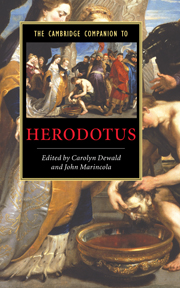Book contents
- Frontmatter
- Introduction
- 1 Herodotus and the poetry of the past
- 2 Herodotus and his prose predecessors
- 3 Herodotus and tragedy
- 4 The intellectual milieu of Herodotus
- 5 Meta-historiē: Method and genre in the Histories
- 6 The syntax of historiē: How Herodotus writes
- 7 Speech and narrative in the Histories
- 8 Herodotus, Sophocles and the woman who wanted her brother saved
- 9 Stories and storytelling in the Histories
- 10 Humour and danger in Herodotus
- 11 Location and dislocation in Herodotus
- 12 Herodotus and the natural world
- 13 Herodotus and Greek religion
- 14 Warfare in Herodotus
- 15 Herodotus, political history and political thought
- 16 Herodotus and the cities of mainland Greece
- 17 An alternate world: Herodotus and Italy
- 18 Herodotus and Persia
- 19 Herodotus and foreign lands
- 20 Herodotus' influence in antiquity
- Glossary
- Timeline
- Bibliography
- Index
- Series List
Introduction
Published online by Cambridge University Press: 28 January 2007
- Frontmatter
- Introduction
- 1 Herodotus and the poetry of the past
- 2 Herodotus and his prose predecessors
- 3 Herodotus and tragedy
- 4 The intellectual milieu of Herodotus
- 5 Meta-historiē: Method and genre in the Histories
- 6 The syntax of historiē: How Herodotus writes
- 7 Speech and narrative in the Histories
- 8 Herodotus, Sophocles and the woman who wanted her brother saved
- 9 Stories and storytelling in the Histories
- 10 Humour and danger in Herodotus
- 11 Location and dislocation in Herodotus
- 12 Herodotus and the natural world
- 13 Herodotus and Greek religion
- 14 Warfare in Herodotus
- 15 Herodotus, political history and political thought
- 16 Herodotus and the cities of mainland Greece
- 17 An alternate world: Herodotus and Italy
- 18 Herodotus and Persia
- 19 Herodotus and foreign lands
- 20 Herodotus' influence in antiquity
- Glossary
- Timeline
- Bibliography
- Index
- Series List
Summary
Few historians, indeed few writers, of any era have been subjected to such widely divergent evaluations as Herodotus of Halicarnassus. Throughout antiquity we can detect two schools of thought about him, one seeing him as the 'father of history', the first person to put together an accurate account of the past and to infuse it with meaning by giving causes, consequences, and the intentions of the participants. But there was also a persistent strain of criticism that took Herodotus to task for his stories of the fabulous and the improbable, for the accuracy of his reports of non-Greek lands, and for his portrayal of a quarrelsome and disunited Greek force. Herodotus continued to be read, however, because of the beauty of his style, his obvious gifts as a narrator, and because enough people saw in him an appropriate predecessor for what they themselves were trying to achieve.
Like Herodotus' Histories, this Companion is a product of its time and place. The ways in which scholars view Herodotus today have arisen from dependence on, but also debate with, those who have preceded them. In this Introduction, we first survey briefly the various strains of Herodotean scholarship (with special emphasis on more recent trends), and then discuss the various contributions to this volume, trying to situate the work to be found here in the larger context of contemporary Herodotean studies.
- Type
- Chapter
- Information
- The Cambridge Companion to Herodotus , pp. 1 - 12Publisher: Cambridge University PressPrint publication year: 2006
- 2
- Cited by

